Top-Rated and Budget-Friendly: Discover the Best Value Medical Alert Systems IN 2024
The best-value medical alert systems offer comprehensive services at an affordable price. They combine essential features like automatic fall detection, emergency services, and GPS tracking with affordable pricing structures.
Brio House is an independent review site. We may earn money when you click links inside our site.
Navigating the complex world of healthcare technology, it’s easy to encounter a vital tool that has reshaped the lives of many: the medical alert system. These ingenious devices, often wearable, serve as personal emergency response systems designed to alert emergency services at the click of a button. Whether it’s a sudden medical emergency, a fall, or other unforeseen accidents, medical alert systems have proven themselves invaluable time and time again.
Yet, as with any technology, there’s a considerable spectrum of price points and features. For this reason, we’re shining a spotlight on the best-value medical alert systems. Because, in reality, safeguarding one’s health shouldn’t come with an exorbitant price tag. Reliable, robust, and user-friendly, these budget-friendly options allow you to enjoy peace of mind without straining your wallet.
Choosing the right system, however, is a decision that requires careful consideration. Each individual’s needs are different, and selecting the best but most affordable medical alert system should be personalized. Factors such as lifestyle, health condition, living situation, and budget all play a significant role. Whether it’s a device purely for home use or one offering on-the-go protection, it’s crucial to invest in a system that offers the right features for your unique requirements. After all, it’s more than just a device; it’s a lifeline.
Understanding Medical Alert Systems
A medical alert system, also known as a personal emergency response system (PERS), is designed to signal the presence of a hazard requiring urgent attention and to summon emergency medical personnel. Often worn as a pendant or a bracelet, these devices provide an immediate line of communication to help in an emergency.
There are generally two main types of medical alert systems:
- home-based medical alert systems
- mobile medical alert systems
Home medical alert systems are designed to work within the confines of your home. They consist of a wearable help button and a base station that connects to your home phone line, acting as a two-way communication device between the user and the response center.
On the other hand, mobile medical alert systems operate on a cellular network and can function anywhere with cell service. These benefit active seniors who often leave home, providing protection wherever they go.
The type of connection a medical alert system uses can vary. Some systems require a landline connection, which can be reliable but limits mobility. In contrast, others use a cellular connection, offering more flexibility as they can operate anywhere with cellular service. This diversity in types and features ensures a medical alert system suits virtually everyone’s needs and circumstances.

Key Factors to Consider When Choosing a Medical Alert System
Navigating the broad array of medical alert systems can be daunting. However, keeping these key factors in mind can simplify the process and help you find affordable medical alerts that offer the best value for your money.
Budget Considerations:
It is essential to understand all costs associated with a medical alert system. Typically, these systems have a monthly fee, varying based on the services and features offered. However, don’t forget to factor in additional costs like equipment fees for the device itself and possible activation fees when setting up the system. By considering all these expenses, you can accurately assess what fits into your budget.
System Type:
Are you or your loved one primarily homebound, or is a more active lifestyle involved? An in-home system could be sufficient for those who spend most of their time at home. However, if you or your loved one are often on the go, a mobile medical alert system, which provides protection anywhere, might be a better fit.
Extra Features:
Some medical alert systems offer extra features that could be beneficial, depending on your specific needs. Medication reminders can be a great help for those who have complex medication schedules. Location tracking can provide peace of mind for caregivers of seniors who may wander due to conditions like dementia. Some systems even have a caregiver app, allowing loved ones to monitor the user’s status and receive alerts.
Compatibility with Mobile Devices and Smart Devices:
In today’s digital age, many medical alert systems are designed to sync with mobile and smart devices. If you or your loved one frequently use such devices, finding a system that pairs with them can offer additional convenience and functionality.
Contract Terms and Conditions:
Before signing up for a medical alert system, it is crucial to understand the terms and conditions of the contract fully. Look for services that offer a price lock guarantee to ensure your costs won’t unexpectedly increase.
By considering these factors, you’ll be better equipped to find a medical alert system that offers both affordability and the features and reliability you need for peace of mind.

Do most medical alert systems offer fall detection?
Most medical alert systems now offer fall detection as an optional feature. It’s an additional service that automatically signals the monitoring center if a fall is detected, even if the wearer cannot manually press the help button.
What are the Best Value Medical Alert Systems in 2024?
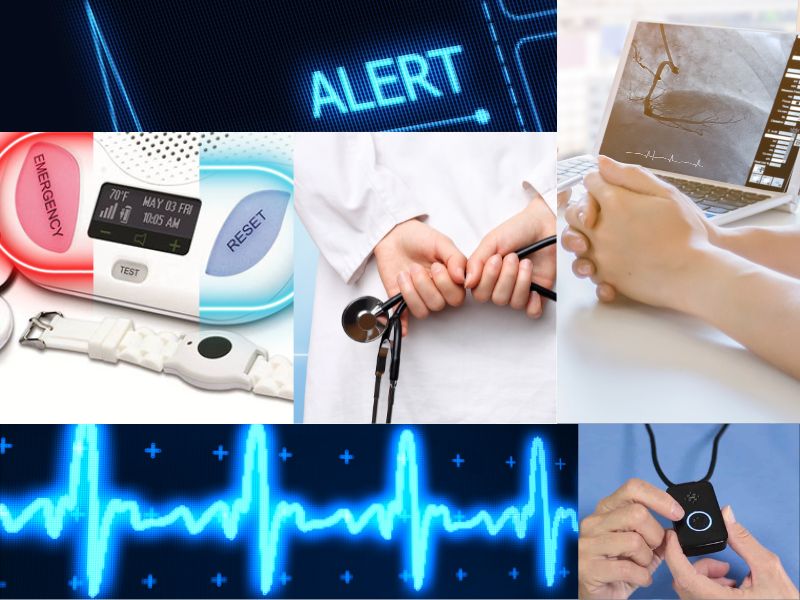
Reviews: Top-Rated and Budget-Friendly Medical Alert Systems of 2024
As we move further into 2023, we’re seeing impressive strides in the arena of medical alert systems. This year’s top medical alert systems effectively combine reliability, robust features, and budget-friendly options.
Most affordable medical alerts that have emerged as industry leaders this year include Bay Alarm Medical, Medical Guardian, Lively Mobile Plus, and ADT Home Security System. Each of these brands brings its unique spin on medical alert technology, offering devices and services designed to cater to various needs and lifestyles.
1. Bay Alarm Medical
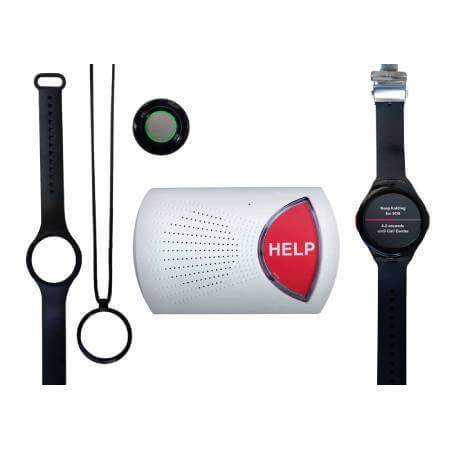
Bay Alarm Medical
Our Rating:

4.8
Bay Alarm Medical has been a trusted name in the industry for years, offering a comprehensive suite of in-home medical alert systems and mobile devices. Their devices come equipped with automatic fall detection, and they offer a range of packages to suit different budgets, making them an excellent choice for many.
Best Key Features
2. Medical Guardian
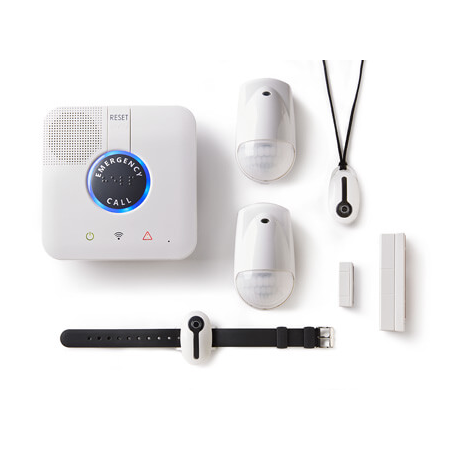
Medical Guardian
Our Rating:

4.7
Medical Guardian, on the other hand, stands out for its innovative approach, integrating modern technology seamlessly into their medical alert devices. The company offers both traditional in-home systems and mobile options, with their smartwatch medical alert system being a unique offering that merges medical alert functionality with the convenience of a wristwatch.
Best Key Features
3. Lively Mobile Plus
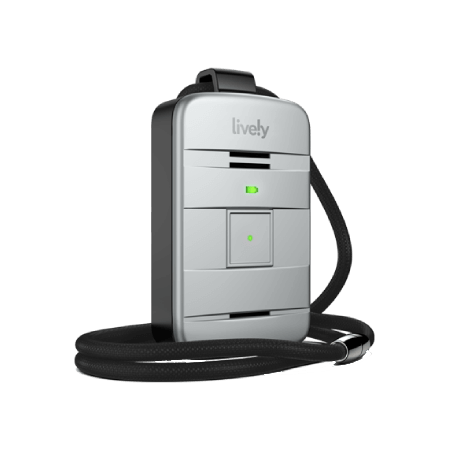
Lively Mobile Plus
Our Rating:

4.7
Lively Mobile Plus is renowned for its highly-rated mobile systems. Known for their compact, lightweight design, these devices offer a sense of security for active seniors. They offer fall detection, water resistance, and relatively long battery life – all crucial features for on-the-go protection.
Best Key Features
4. ADT Home Security System
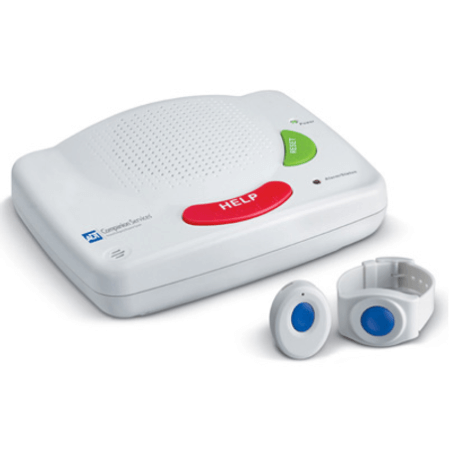
ADT Home Security System
Our Rating:

4.6
ADT Home Security System has a solid reputation for providing top-quality home security solutions and extends this same commitment to excellence to its medical alert systems. Their offerings prioritize safety, reliability, and user-friendliness, making them a great option for seniors looking for the best value.
Best Key Features
As more and more seniors and their families realize the benefits of mobile medical alert systems, we see a surge in their popularity. Mobile systems provide safety at home and wherever you have cellular coverage. These systems often include GPS location tracking, providing users with an added layer of safety. While they can be a bit pricier than their in-home counterparts due to the advanced technology, many find the added peace of mind worth the extra cost.
Choosing the right medical alert system depends on personal needs, lifestyle, and budget. Each of these top-rated systems brings strengths to the table, providing excellent options to find the best fit.
Comparison of the Best and Most Affordable Medical Alert Systems
While having an array of options can be beneficial, it can also complicate decision-making.
Analysis of Medical Alert System Users’ Reviews:
User reviews provide insightful, real-world experiences that can significantly aid in selecting the most suitable medical alert system. They can give you a clearer picture of how these systems operate day-to-day, the customer service experience, and any common issues. Users value reliability, ease of use, prompt response times, and quality customer service.
In-depth Review of the Cheapest Medical Alert Systems Available:
While affordability is key, it should not compromise on safety and reliability. Some companies offer cost-effective solutions without cutting corners on essential features. Look out for those offering competitive monthly rates, low or no equipment fees, and minimal to zero activation fees. Remember that cheapest doesn’t always mean best, so evaluate these options against your needs and requirements.
By comparing different systems based on their features, cost, and user feedback, you can hone in on the most suitable and affordable systems that cater to your needs.
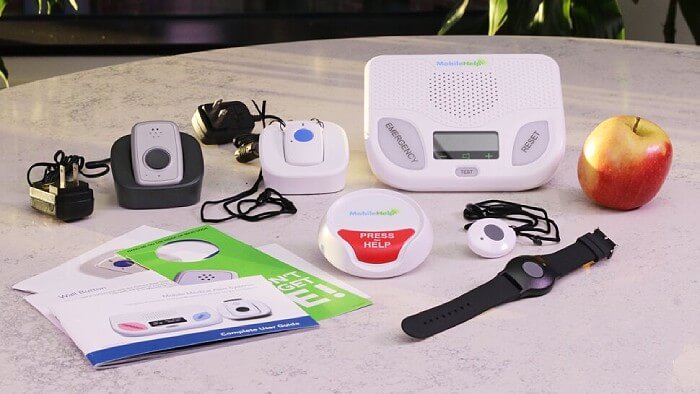
How to Get the Best Value Medical Alert System
Getting the best value medical alert system goes beyond finding the cheapest option. It involves identifying a system that provides the needed features at a price that fits your budget. Here are some steps to help guide you to the best value choice.
Checklist for Choosing the Right Medical Alert System:
- Price: Determine your budget before you start shopping. Consider the initial medical alert systems cost, monthly fees, and hidden charges like activation or equipment fees.
- Features: Identify the essential features for you or your loved one. These could include fall detection, GPS tracking, mobile or in-home system, caregiver apps, etc.
- Provider Reliability: Check out the reputation of the provider. They should have reliable customer service, favorable user reviews, and a track record of prompt response times.
Importance of Thorough Research and Reading User Reviews:
Before deciding, take the time to thoroughly research potential medical alert systems. Look at the features they offer, the cost, and the company’s reputation. User reviews can provide invaluable insights into the reliability and effectiveness of the system and the company’s customer service.
Free Medical Alert System Options:
In some cases, you may be able to acquire a medical alert system for free. Some companies offer promotional deals where the equipment is provided at no cost when you pay for the monitoring service. Non-profit organizations and government programs may provide medical alert systems for free or at a reduced cost for qualifying individuals. Be sure to explore these options to see if you qualify.
Choosing the best value medical alert system may take some time and effort, but the peace of mind it provides is worth the investment. Remember, the goal is not to find the cheapest option but the one that offers the best balance of price, features, and reliability for your specific needs.
How Medical Alert Companies Stand Out
The market for medical alert systems is competitive, and companies continually strive to distinguish themselves by offering innovative features and superior services. Understanding how these companies set themselves apart can help you identify which one might be the best fit for your needs.
Overview of What Medical Alert Companies Offer:
Medical alert companies offer various devices and services to ensure the safety of seniors and individuals with medical conditions. They provide equipment that helps users to call for help in emergencies with the simple push of a button. Some companies offer systems for use in the home, while others offer mobile devices for use on the go. In addition, many companies provide 24/7 monitoring services, ensuring that help is always a button press away.
Role of Monitoring Centers in Providing Prompt Response:
One of the critical aspects of any medical alert system is the monitoring center. These centers are staffed 24/7 by trained professionals who can respond immediately when a user presses their alert button. They can assess the situation, provide reassurance, and dispatch necessary emergency services. The quality and responsiveness of a company’s monitoring center is a significant factor that helps it stand out from the crowd.
Special Features Offered by Some Medical Alert Companies:
Many medical alert companies offer special features beyond the standard emergency button to set themselves apart. These can include:
- Optional Fall Detection: This feature can automatically detect if the user has fallen and send an alert to the monitoring center, even if they can’t press the button themselves.
- Cellular Service: For users who don’t have a landline or are often on the go, some companies offer devices that operate using a cellular connection, ensuring they’re always connected no matter where they are.
- Caregiver App: Some companies offer apps that caregivers can use to monitor their loved one’s status, receive alerts, and even track their location, providing an additional layer of security and peace of mind.
You can find a medical alert system that provides value and reliability by considering what each company offers and how their services can meet your specific needs.
Frequently Asked Questions:
What is an in-home medical alert system?
An in-home medical alert system, also called a home-based or residential medical alert system, is designed to signal the presence of a hazard requiring urgent attention, typically health-related, and summon emergency medical personnel. These systems are often used by seniors or individuals with health concerns who wish to live independently yet ensure they can get help quickly.
The system typically consists of two components: a base unit and a wearable help button. The base unit is a device usually connected to a home phone line (landline) or a cellular network, while the wearable help button is designed to be worn around the neck as a pendant, on the wrist like a watch, or attached to clothing.
When the wearer presses the help button, the system immediately contacts a monitoring center staffed with trained professionals who can assess the situation, provide immediate assistance, and dispatch emergency services if necessary.
These systems are designed to work inside the home and often have a certain range within which the help button will work, such as within 600 to 1,500 feet of the base unit. Some in-home medical alert systems also offer features like automatic fall detection, which can alert the monitoring center even if the individual cannot press the button.
Can an in-home medical alert system work with mobile devices?
Yes, many modern in-home medical alert systems can work with mobile devices. These systems can connect to your smartphone or tablet using various technologies, such as Bluetooth or Wi-Fi. This feature allows users or their caregivers to receive alerts, monitor activity, or even adjust settings on the medical alert system through an application installed on the mobile device.
For example, some systems offer caregiver apps, which allow family members or caregivers to receive updates about the system’s status, get alerts if the emergency button is pressed, or even track the user’s location in the case of mobile alert systems.
However, not all medical alert systems come with these features. If this level of connectivity is important to you, ensure you choose a system and plan that offers this compatibility with mobile devices. It’s always best to consult with the medical alert company directly to understand their systems’ full range of features.
Which medical alert device to choose: landline or cellular connection?
Landline medical alert systems use your home’s phone line to connect to the monitoring center, while cellular systems use the same type of wireless technology as mobile phones. Not all medical alert systems require a landline connection. While some systems do work over a traditional phone line, many modern systems use a cellular connection, making them ideal for households without a landline. Cellular systems offer greater flexibility as they can work anywhere with a cellular signal and are not tied to your home.
What is a mobile system in the context of medical alert systems?
A mobile system is designed to work both inside and outside the home. Unlike traditional home-based systems that only function within a certain range of the base unit, these portable devices protect users wherever they go.
Mobile medical alert systems typically use GPS (Global Positioning System) technology and cellular networks. When the help button on the device is pressed, the system connects to a monitoring center. Because of the GPS and cellular technology, the user’s location can be determined, and help can be sent directly to that location, no matter where they are.
These systems often come as wearable devices, such as necklaces or wristbands, that are lightweight and easy to carry around. Some even come with advanced features such as automatic fall detection, medication reminders, geofencing for wandering detection, and fitness tracking.
This system is especially useful for active seniors or those who frequently leave their homes, ensuring they can get help no matter where they are.
Who should consider an “on-the-go” system?
“On-the-go” systems are ideal for active seniors or anyone who frequently leaves their home and wants to ensure they can access help if needed. It’s also a good choice for those who travel often, whether for day trips or longer vacations.
What is a price lock guarantee in relation to medical alert systems?
A price lock guarantee is a promise from the medical alert company that the monthly rate you start with will remain the same as long as you’re a customer. It means that your rates won’t increase over time.
Do most medical alert systems offer fall detection?
Most medical alert systems now offer fall detection as an optional feature. It’s an additional service that automatically signals the monitoring center if a fall is detected, even if the wearer cannot manually press the help button.
What role does a monitoring center play in a medical alert system?
The monitoring center is a crucial part of a medical alert system. When the help button on a medical alert system is pressed, the signal is sent to a monitoring center. Trained operators at the center then assess the situation and dispatch appropriate help.
How do I choose between medical alert providers?
Choosing between medical alert system providers depends on your specific needs and budget. Consider factors like pricing, contract terms, available features like fall detection and GPS tracking, the type of connection (landline or cellular), and the reputation of the provider’s monitoring center.
What should I look for in a medical alert company?
When choosing a medical alert company, look for transparent pricing with no hidden fees, good customer reviews, reliable 24/7 monitoring, high-quality equipment, reasonable contract terms, and responsive customer service. Also, consider if they offer features you might need, like fall detection or mobile system options.
The Bottomline:
Investing in a medical alert system is crucial to securing the safety and independence of those at risk of medical emergencies. A reliable, responsive, and feature-rich system offers peace of mind for the user and their loved ones.
The best-value medical alert systems offer comprehensive services at an affordable price. They combine essential features like automatic fall detection, emergency services, and GPS tracking with affordable pricing structures. This combination ensures that more individuals can access these systems’ potentially life-saving services.
Choosing the right medical alert device is a personal decision based on individual needs, budget, and lifestyle. When shopping for a system, take the time to research the different options, read user reviews, and compare features and pricing. Don’t hesitate to contact the companies directly to ask questions and clarify any concerns you may have.
Your safety or the safety of your loved one should always be the priority. While cost is a critical factor, it should not be at the expense of necessary features and reliability. Remember that the right medical alert system can provide invaluable peace of mind by ensuring that help is always available at the press of a button.
The best medical alert systems are the one that meets your specific needs, offers reliable service, and fits within your budget. Make an informed choice and secure peace of mind by knowing help is always just a button press away.
